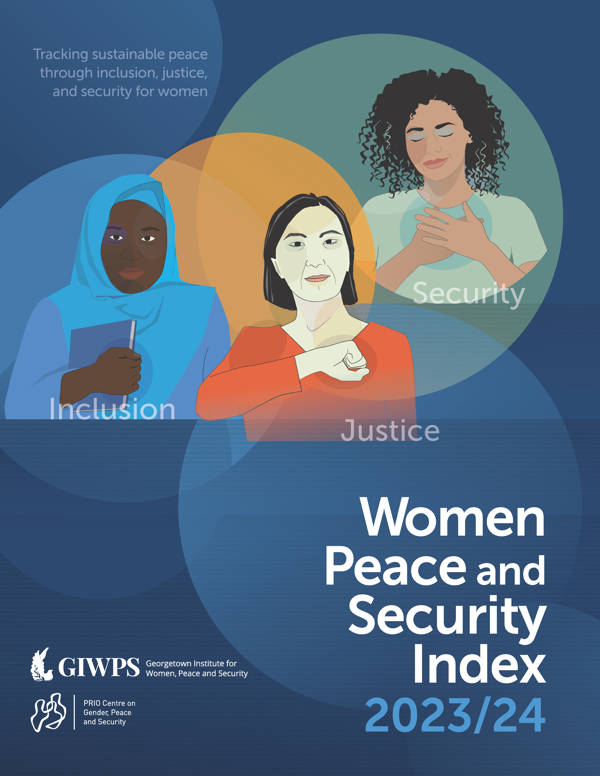In 2017, the PRIO Centre on Gender, Peace and Security and the Georgetown Institute for Women, Peace and Security developed a new global index providing a comprehensive measure of women’s well-being. The Women, Peace, and Security (WPS) Index offers a simple and transparent measure that captures women’s autonomy and empowerment at home, in the community, and in society. The WPS Index is the first gender index to include a focus on women’s security, bringing together three dimensions: inclusion, justice, and security.
The second edition of the Index was successfully launched at United Nations Headquarters in New York on 22 October 2019. The Index provides important insights into patterns and progress on women's well-being and empowerment around the world. It reflects a shared vision that countries are more peaceful and prosperous when women are accorded full and equal rights and opportunities.
While just two years have passed since the inaugural WPS Index was published, major insights can be drawn from recent trends. There have been significant recent advances in women's well-being around the world, but progress is still too slow, and uneven across dimensions and countries. The analysis of changes over time reveals the key drivers of progress as well as major areas of concern. On a positive note, the world is generally moving in a positive direction; while as many as 59 countries improved 5 percent or more of their 2017 score, only one country, Yemen, declined more than 5 percent. In 2019, Norway ranks first, closely followed by Switzerland, Finland and Sweden. At the bottom of the list are Yemen, Afghanistan and Syria. As in 2017, all regions include at least one country that outperforms the global average.
Innovations in the Second Edition of the WPS IndexThe second edition of the WPS Index adds more than a dozen countries – including Libya and South Sudan – that meet the minimum requirements of recent and reliable data across the three dimensions. Several innovations this year have enhanced the value of the Index. Improvements in data availability have expanded coverage to 167 countries – encompassing more than 98 percent of the world's population.
Greater data availability has enabled the use of data on the current (past 12 months) prevalence of intimate partner violence in place of data on women's lifetime experience of intimate partner violence. This change permits tracking changes in prevalence over time.
In this edition, we have used data revisions and updates from the International Labour Organization, the United Nations, the World Bank, and other authoritative sources to continue to ensure the reliability of the data on which the Index is based.
The Index also assesses data at the subnational level for three of the most populous and most diverse countries: China, India, and Nigeria. The subnational indices reveal enormous diversity behind the national scores. This is most prominent in Nigeria, where the disparities between the state-level scores and women's corresponding well-being are equivalent to the differences between Mauritius (ranking 60th) and Afghanistan (166th).
The WPS Index 2019/20 can be accessed here.
Why make a WPS Index?
Women are at the heart of efforts to achieve sustainable peace through inclusion, justice, and security worldwide. This notion is explicit in the 2000 agenda established by United Nations Security Council Resolution 1325 on Women, Peace and Security. The agenda urged all actors to increase women's participation and incorporate gender perspectives in all UN peace and security efforts. In 2016, the United Nations General Assembly and the United Nations Security Council adopted resolutions on 'Sustaining Peace', which have been hailed as a transformative shift, from peacebuilding to sustaining peace as 'a goal and a process to build a common vision of society'. The Sustaining Peace Agenda complements the 2030 Agenda for Sustainable Development, which recognizes the need to build inclusive, just, and peaceful societies for all.
Global indices are a way to assess and compare national progress against such goals, by distilling an array of complex information into a single number and ranking. While there are a growing number of global indices, none has brought together the three important dimensions of women's inclusion, justice, and security. Gender indices are typically limited to indicators of inclusion, such as whether women complete secondary school or are in paid work. These aspects of inclusion are undoubtedly important, but they are incomplete in the absence of aspects of justice and security. It is surely misleading to focus exclusively on girls' schooling where girls are not safe in their home or community. Likewise, traditional measures of security include an array of conflict indicators and assessments but invariably ignore systematic bias and discrimination against women and girls.
The Index is an important utility for many sectors. Policymakers will be able to use its rankings to evaluate progress and set priorities, the private sector can make use of it as a tool for risk analysis, and civil society activists can celebrate achievements, highlight gaps, and hold their governments accountable for implementing the women, peace and security agenda.
The Global Women, Peace and Security Index 2017/2018
The first edition of the WPS Index is structured around three basic dimensions of women's well-being: inclusion, justice, and security. It ranks 153 countries and covers more than 98 percent of the world's population. The index was launched 26 October 2017 in New York, as a side-event to the UN Security Council Open Debate on Women, Peace and Security.










